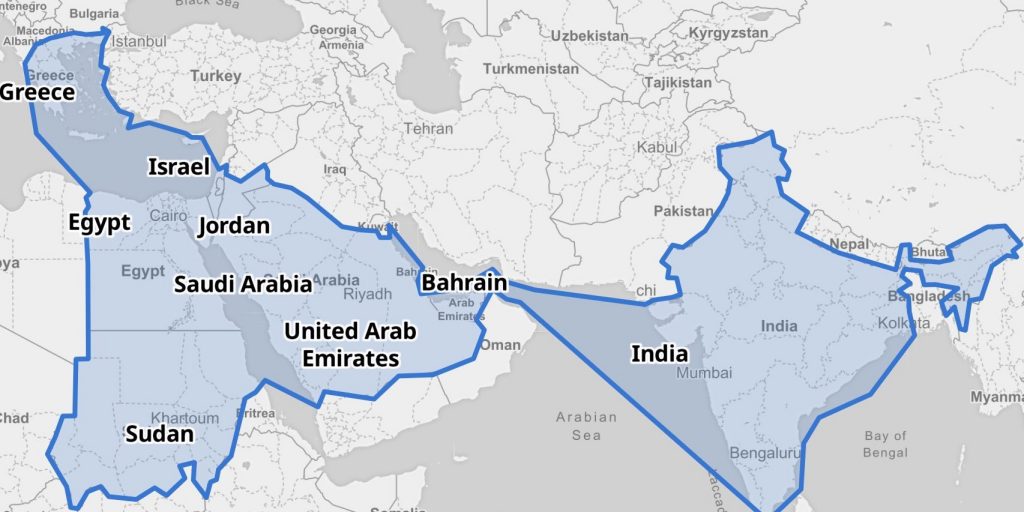
A few years ago, I was looking for a new writer for our Tsionizm.com site. We approached a well know Israeli writer, and he asked for a subject. I told him he should write something about the emerging alliance across the southern arc of the Middle East. The writer scoffed. He said there was evidence of such an alliance and no impetus. Respectfully I disagreed. Today, a friend sent a tweet from this writer with his new map of the Middle East. It encompassed all I told him with a few additions, like Sudan, because nobody saw that coming. So why is that so important today, and who brought it to fruition?
The answer to the second part is none other than President Donald J Trump. His Abrahamic Accords may become the single most important development in the Middle East since the historic peace between Egypt and Israel in the wake of the Yom Kippur War. It will surpass it in many ways because Egypt’s engagement with Israel was at a state level, and never permeated to the Arab street. On the other hand, the United Arab Emirates have openly welcomed Israel and Israelis to visit and do business in the UAE. Since the agreements, Sudan has been added and now it seems Saudi Arabia will join the new coalition.
For years, Western diplomats have focused on the Palestinian aspect of Middle East peace to exclusion of all other efforts. The conventional wisdom was that without solving the “Palestinian problem” there could be no peace. When President Trump declared that the Palestinians were not negotiating in good faith, he announced he would turn his attention to other Arab states and circumvent them. Former Secretary of State John Kerry scoffed. As a reminder this is what he said.
“There will be no separate peace between Israel and the Arab world. I want to make that very clear with all of you. I’ve heard several prominent politicians in Israel sometimes saying, ‘Well, the Arab world is in a different place now. We just have to reach out to them. We can work some things with the Arab world and we’ll deal with the Palestinians.’ No. No, no, and no.”
Clearly, Kerry was wrong, and President Trump knew what McArthur knew about bypassing islands in the South Pacific. Sometimes you bypass the difficult battles and leave them to another day.
Now to the first question, why is this important? Israel and the Arab nations have been pawns. The British and French carved them up in the wake of World War One for their own empires. The Soviets and Americans used them as client states to fight proxy wars. The Chinese have used them for oil and testing weapons. The west came for Israeli technology. No one actually cared about them, because as divided nations they had no power.
But no saw what President Trump saw. Collectively, the Middle East has more than just oil or technology. Combined, they can become a power in their own right. Beyond the common enemy, Iran, the Gulf States, including Saudi Arabia, have tremendous oil resources, but understand that some time in the future this will end. Crown Prince Mohammed bin Salman understands the urgency. He wants to reinvest these resources into something more than new palaces. He sees a future beyond oil. Israel has technology yet sells their companies and ideas to American and European multinationals in order to bring them to the world market. Imagine a world whereby Arab oil money finances those companies instead. The Arabs need a post-oil future and Israel needs the capital to flesh out their ideas without giving up control.
The power of this alliance does not end in the Middle East. For decades, Israel and India have developed a close relationship. India has a population that rivals China. They have industry and technology as well. The combined resources of these three groups will draw the rest of the Middle East and North Africa into an alliance that respects them for their own unique culture. Too long they have been manipulated by others against their own common good despite common roots. All this was made possible by the asymmetric thinking of an American president whose outlook on life and business sought out the good in us all rather than focusing on the negative. While politics prevented President Trump from receiving a Nobel Prize for Peace, the lasting mark he made upon the Middle East will last for many generations to come.
- Head Of Iran’s Nuclear Weapons Program Assassinated…Mullahs Blame Jewish State
- THE JEWISH VOTE: POLITICAL SELF-DESTRUCTION


